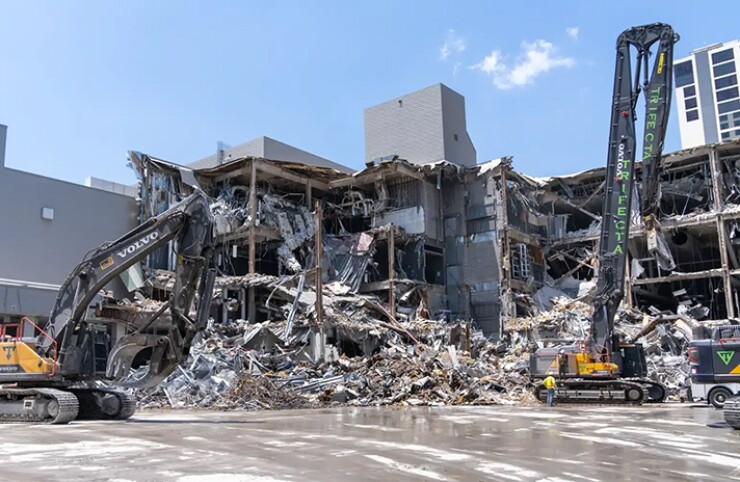Austin sets debt sale, eyes tax hike election to plug budget holes
5 min read

Adobe Stock
Austin, Texas, is gearing up to issue about $810 million of debt, as it considers seeking a property tax increase this year to address budget shortfalls and a bond election in 2026.
The city council on Thursday approved the debt sale and other debt-rated agenda items despite calls during public hearings to slow down the process.
The deal, scheduled to price in September, includes $384.45 million of tax-exempt and $84.725 million of taxable general obligation public improvement bonds, as well as $303.2 million of tax-exempt and taxable certificates of obligation, according to a draft preliminary official statement.
The proceeds will finance transportation, affordable housing, flood mitigation, parks, library, health, public safety, and other projects with the GO bonds tapping authorization approved by Austin voters in 2012, 2016, 2018, and 2020, according to a staff report.
Up to $169.47 million of the debt will refund for present value savings callable public improvement bonds issued in 2012 and 2015 and certificates of obligation issued in 2012.
Public property finance contractual obligations totaling $38 million will pay for vehicles, public safety and medical equipment, and technology.
Austin’s existing GO and other tax-supported debt for governmental activities, which totaled about $1.65 billion as of Sept. 30, is rated AAA by S&P Global Ratings and AA-plus by Fitch Ratings with stable outlooks.
The council also authorized the city’s application for an up to $59 million low-interest loan through the Texas Water Development Board’s clean water state revolving fund for the Walnut Creek Wastewater Treatment Plant expansion project. Austin Water is also seeking a $447 million low-interest loan from the U.S. Environmental Protection Agency under the
“The total project cost is estimated at $1 billion, with $506 million funded through the combined low-interest loans and the remaining $494 million financed using a combination of cash and revenue bonds,” a statement from Austin Water said, adding the loans and revenue bonds are expected to be repaid within 30 years.
Ahead of city council approval, Bill Bunch, executive director of Save Our Springs, said action on some of the debt-related agenda items should be postponed and considered within the context of the budget situation.
“We have phenomenal uncertainty around what are these things, these big projects, really going to cost,” he told the council. “With tariffs, with supply chain issues, with workforce issues, with climate change, weather disasters, heat waves, flooding, in particular – all of these big ticket spending items that commit our city for years, decades and in essence, are permanent decisions.”
Earlier this month, the city administration unveiled a $6.3 billion
Mayor Kirk Watson said the city should consider asking voters for a property tax rate increase this year.
“Things like the increased cost of living, tariffs, loss of federal grants, the end of the American Rescue Plan Act money from the federal government, and other factors have made our local budgeting process more difficult,” his July 14 Watson Wire newsletter said.
The mayor also pointed to a 3.5% state-imposed property tax revenue cap.
“Austin still needs investment to be successful,” his newsletter added. “We still need high-quality services to have a high quality of life.”
City finance officials
Earlier this year, Austin lost a $50 million grant for flood mitigation after the Federal Emergency Management Agency terminated the Building Resilient Infrastructure and Communities Program. In the wake of devastating flooding in Central Texas over the July 4th holiday weekend, a
As Texas’ capital city ponders budget fixes, its infrastructure needs are growing. The city council created an advisory task force to identify and
City finance officials have recommended a ballot amount not to exceed $687 million, while “feasible”
Austin voters authorized
Wells Fargo leads the underwriting team for the upcoming debt sale with co-senior manager Raymond James & Associates and co-managers Robert W. Baird & Co., Ramirez & Co., and Stifel Nicolaus & Co. PFM Financial Advisors is the financial advisor, McCall, Parkhurst & Horton is the bond counsel, and Orrick, Herrington & Sutcliffe is disclosure counsel.

Austin Convention Center
Items on the council’s Thursday agenda related to a $1.6 billion convention center redevelopment raised concerns
“The truth is, the center has never turned a profit when you include construction debt and full operational costs,” said Laura Templeton, a former Austin Downtown Commission board member. “You are now proposing to double down, literally with a multi-billion dollar rebuild, hoping that bigger will fix a fundamentally broken business model.”
As of Sept. 30, outstanding convention center bonds backed by hotel occupancy and special motor vehicle rental tax revenue totaled $68.66 million from issues sold in 2008, 2012, and 2017 with final maturities in 2029, according to the city’s
“The (redevelopment) project is fully funded by the Austin Convention Center’s share of hotel occupancy tax revenue, project financing zone revenues and its own revenues, no property tax dollars are used,” Derick Hackett, acting spokesman for the convention center department, said in an email.
Debt issuance for the project will depend on final cash flow needs and timing, with current models showing about 80% of the project would be financed with bonds and the remainder from cash reserves, he added.
The city council also greenlit an up to $100 million unconditional standby line of credit with a three-year term for Austin Energy with Sumitomo Mitsui Banking Corporation to replace a current LOC that expires Sept. 28. The utility needs the credit facility to participate in Electric Reliability Council of Texas markets.
Austin Affordable PFC, an affiliate of the city’s housing authority, was authorized to issue up to $40 million of multi-family, private-activity bonds for an affordable rental development.







